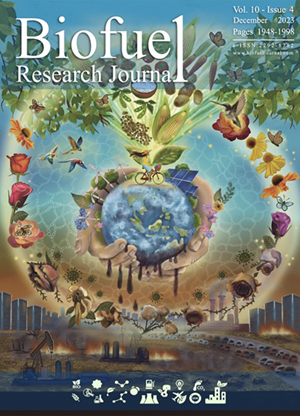废弃生物质热化学转化的建模研究综述
IF 11.9
Q1 ENERGY & FUELS
引用次数: 64
摘要
热化学过程,包括热解、焙烧、气化、燃烧和水热转化,被认为比生物化学过程更有效地将废弃生物质转化为能源和增值产品。从化学的角度来看,热化学过程非常复杂,对许多物理化学性质非常敏感,因此使反应器和过程建模更具挑战性。然而,这些工艺的成功商业化取决于优化的反应器和工艺设计,这可以通过建模和仿真有效地实现。针对废弃生物质的热化学转化的具体应用,已经开发了具有许多简化假设的各种规模的模型。然而,对于每个模型的适用性、局限性、准确性、有效性和特殊性的尺度,需要探索研究的空白。本综述研究对所有已建立的工业热化学转化过程的现有模型的上述重要方面和特征进行了研究,重点是废弃生物质,从而弥补了上述研究空白,并在反应器设计、过程控制和优化方面展示了商业规模的适用性,以及升级现有模型以提高精度的潜在途径。本文章由计算机程序翻译,如有差异,请以英文原文为准。
Modeling of thermochemical conversion of waste biomass – a comprehensive review
Thermochemical processes, which include pyrolysis, torrefaction, gasification, combustion, and hydrothermal conversions, are perceived to be more efficient in converting waste biomass to energy and value-added products than biochemical processes. From the chemical point of view, thermochemical processes are highly complex and sensitive to numerous physicochemical properties, thus making reactor and process modeling more challenging. Nevertheless, the successful commercialization of these processes is contingent upon optimized reactor and process designs, which can be effectively achieved via modeling and simulation. Models of various scales with numerous simplifying assumptions have been developed for specific applications of thermochemical conversion of waste biomass. However, there is a research gap that needs to be explored to elaborate the scale of applicability, limitations, accuracy, validity, and special features of each model. This review study investigates all above mentioned important aspects and features of the existing models for all established industrial thermochemical conversion processes with emphasis on waste biomass, thus addressing the research gap mentioned above and presenting commercial-scale applicability in terms of reactor designing, process control and optimization, and potential ways to upgrade existing models for higher accuracy.
求助全文
通过发布文献求助,成功后即可免费获取论文全文。
去求助
来源期刊

Biofuel Research Journal-BRJ
ENERGY & FUELS-
CiteScore
22.10
自引率
1.50%
发文量
15
审稿时长
8 weeks
期刊介绍:
Biofuel Research Journal (BRJ) is a leading, peer-reviewed academic journal that focuses on high-quality research in the field of biofuels, bioproducts, and biomass-derived materials and technologies. The journal's primary goal is to contribute to the advancement of knowledge and understanding in the areas of sustainable energy solutions, environmental protection, and the circular economy. BRJ accepts various types of articles, including original research papers, review papers, case studies, short communications, and hypotheses. The specific areas covered by the journal include Biofuels and Bioproducts, Biomass Valorization, Biomass-Derived Materials for Energy and Storage Systems, Techno-Economic and Environmental Assessments, Climate Change and Sustainability, and Biofuels and Bioproducts in Circular Economy, among others. BRJ actively encourages interdisciplinary collaborations among researchers, engineers, scientists, policymakers, and industry experts to facilitate the adoption of sustainable energy solutions and promote a greener future. The journal maintains rigorous standards of peer review and editorial integrity to ensure that only impactful and high-quality research is published. Currently, BRJ is indexed by several prominent databases such as Web of Science, CAS Databases, Directory of Open Access Journals, Scimago Journal Rank, Scopus, Google Scholar, Elektronische Zeitschriftenbibliothek EZB, et al.
 求助内容:
求助内容: 应助结果提醒方式:
应助结果提醒方式:


